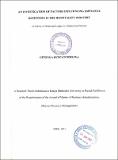| dc.description.abstract | Employee retention is critical for the long-term success and viability of a firm. Good talent is the lifeblood of any organization, and retaining the best employees ensures continued sales, builds long-lasting business relationship and prevents tacit knowledge loss. The purpose of the study was to investigate the factors that have direct influence on employee retention in the hospitality industry. Small businesses do not have the resources to offer the same kind of retention strategies that large companies have to contend with basic retention measures like a competitive salary, profit sharing, flex time, training, day care provisions and fringe benefits, therefore it is relatively easy for large organizations to retain employees, however this is not so in small and medium enterprises especially in the hotels and lodges, the general objective of the study was to investigate the factors influencing employee retention in the hospitality industry cross sectional survey design was used in the study. The population of the study consists of 968 employees of the hotels and lodges in Laikipia East district. A sample size of 121 employees was targeted and responses were obtained from 104 employees. To collect primary data, questionnaires were administered to the employees selected randomly as respondents. The service of research assistants was employed to administer, assist and collect the questionnaires from the various hotels and lodges with the prior authority of the hotels and lodges management. The primary data from questionnaires was coded and analyzed in terms of specific objective and resented in tables to show correlation coefficient, to show the relationships of the independent variables and the dependent variables. The data analysis was both quantitative and qualitative in nature, and used inferential statistics of hi-square-contingency tables to test hypothesis and generate phi correlation coefficient using e statistical package of social science (SPSS-17.0 Version). The findings on the factors that influence employee retention revealed that employee involvement, job security, employment contracts and accessibility to training are the greatest influence to retention in the hospitality industry. It was recommended that the industry should give longer term of contract while hiring - facilitate job security and extensive training to be offered to the employees to improve their knowledge skills and abilities, while more studies to be done in other geographical areas to help generalize the study. | en_US |

